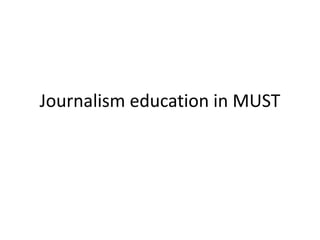Journalism program
- 1. Journalism education in MUST
- 2. Equipment & requirements • Specialized software and hardware Below is the specialized software currently in use for Graduate Studies (included for informational purposes, not necessarily required for student purchase): • Statistics analysis (SPSS, SAS) • Presentations (PowerPoint)
- 3. Course Offerings • ADV 5005 – Advertising Planning • ADV 6006 – Theories of Advertising ADV 6305 – Advanced Media Planning • ADV 6405 – International Advertising • ADV 6503 – Advertising Creative Strategy and Research ADV 6505 – Advertising Research Methods • ADV 6602 – Advertising Management • COM 6315 – Advanced Research Methods • COM 6940 – Individual Work—Supervised Teaching • JOU 5007 – History of Journalism • JOU 5705 – Issues and the Press JOU 6309 – Journalism as Literature • MMC 5015 – Electronic Publishing • MMC 5206 – Advanced Law of Mass Communication • MMC 5306 – International Communication MMC 5308 – Communicating for Success • MMC 5708 – Intercultural Communication • MMC 6202 – Legal Problems of Mass Communications • MMC 6400 – Mass Communication Theory • MMC 6402 – Seminar in Mass Communication Theory • MMC 6409 – Science/Health Communication • MMC 6417 – Seminar in Mass Media & Health • MMC 6421 – Research Methods in Mass Communication • MMC 6423 – Content Analysis Methods • MMC 6428 – Collaborative Communication Research • MMC 6612 – New Media and a Democratic Society • MMC 6615 – Race, Class, Gender and Media • MMC 6618 – Survey of Political Communication • MMC 6619 – Seminar in Political Advertising • MMC 6660 – Mass Communication and Society • MMC 6665 – Seminar in First Amendment Theory • MMC 6666 – Seminar in Research in Mass Communication Law • MMC 6667 – Advanced Topics in Mass Communication Law • MMC 6706 — Covering the Arts MMC 6905 – Individual Work—Independent Study
- 4. Course Offerings • PUR 6005 – Theories of Public Relations (Core) • PUR 6006 – Public Relations Foundations (Core) • PUR 6416 – Public Relations and Fund Raising (Elective) • PUR 6446 – Public Relations and Philanthropy (Elective) • PUR6506 – Public Relations Research (Core) • PUR 6607 – Public Relations Management (Core) • PUR 6608 – International Public Relations (Elective) • PUR 6934 – Issues in Public Relations (Electives) • RTV 5702 – Telecommunication Regulation • RTV 6508 – Audience Analysis • RTV 6801 – Telecommunication Management • RTV 6807 – Telecommunication Outlet Systems and Practices
- 5. What Are the Various Fields of Mass Communication?
- 6. What Qualifications Do You Need? In order to pursue a degree in Mass Communication, you will generally need: (1) SPM / O-Level Qualification Minimum of 5 credits AND (2) Pre-University Qualification A-Level: Minimum of 2Es or 3Ds STPM: Minimum CGPA of 2.0 Australian Matriculation: Minimum ATAR of 60 Canadian Pre-University: At least an average of 60% You could also choose to do a Diploma right after SPM instead of taking a Pre-University programme. Entry requirements for a Diploma is typically 3 credits at SPM level.
- 7. Mass Communication degrees are generally 3 years long. If you decide to do a Diploma instead, it is usually 2 to 2.5 years long. Upon successful completion of your Diploma, you can choose to either start working, or enter directly into Year 2 of a Degree in Mass Communication.
- 10. List of universities in Malaysia offer journalism program Diploma Foundation / Pre- U / A-level Master Postgraduate Certificate










